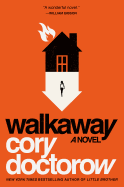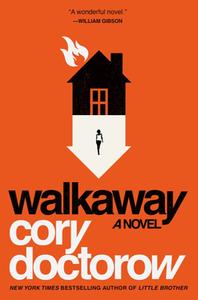
 Cory Doctorow--Internet doyen and successful author in a range of genres, from YA novels like Little Brother to the nonfiction manifesto Information Doesn't Want to Be Free--returns to adult fiction with his novel Walkaway. In Walkaway, dystopia and utopia rub shoulders uncomfortably, offering a nuanced vision of the future that is both believably extrapolated and a prime arena to showcase Doctorow's signature techno-philosophic preoccupations.
Cory Doctorow--Internet doyen and successful author in a range of genres, from YA novels like Little Brother to the nonfiction manifesto Information Doesn't Want to Be Free--returns to adult fiction with his novel Walkaway. In Walkaway, dystopia and utopia rub shoulders uncomfortably, offering a nuanced vision of the future that is both believably extrapolated and a prime arena to showcase Doctorow's signature techno-philosophic preoccupations.
The novel opens in dystopia with bantering malcontents Seth, Natalie and Hubert, Etc. (so nicknamed for his 20-odd middle names) meeting at a "Communist party," where they flirt with counterculture ideas while dodging the watchful eye of the establishment. When the party ends in tragedy, the trio is inspired to drop out of society and join the "walkaways," a group of people resembling technophilic hippies in their idealism and revolutionary lifestyle. Each character finds his or her place among the dreamers after making the harsh adjustment to a society organized in direct counterpoint to the dog-eat-dog, wildly unequal capitalist norms of what they come to refer to as Default.
Doctorow's walkaways are chatty people, prone to extended soliloquys and Socratic dialogues that eat up dozens of pages. The point, of course, is to communicate Doctorow's ideas to the reader as well as the protagonists. It might be wearying were it not for the counterintuitive, fascinating, sometimes competing nature of the ideas. Doctorow's world is violent and unfair, but the walkaways themselves are a surprising font of optimism. Their difficult-to-summarize worldview is based in the conviction that "you got the world you hoped for or the world you feared--your hope or your fear made it so." Doctorow queues up plenty of characters to question the truth of that maxim, but they always seem to end up on the losing end of the argument.
The walkaways' idealism is supported by nearly miraculous technological achievements--they live in a "post-scarcity" society where questions of food and shelter are more or less solved by printers capable of manufacturing almost anything at a moment's notice. Drones and zeppelins inhabit the skies while humans can use exoskeletons to lift large objects and imbibe a wild variety of drugs in order to manage their mental state. The walkaways even seem to have cracked a problem that Default's hyper-rich "zottas" have failed to solve for years: how to live forever. That discovery prompts a vicious crackdown from Default, escalating quickly into a war pitting hacktivist egalitarians against tyrannical robber barons.
Walkaway is awash in unrestrained nerdery, including what has to be the best description of the psychology of watching a progress bar ever put to digital paper. Doctorow is teaching, but he's also having fun, and it's a pleasure to watch him twist the two together. The novel is given velocity by its embrace of love: love for technology, love for science, love for nature, Earth and the human race. Walkaway is a running argument with a fun, funny nerd looking at the future with a mix of fear and hope. --Hank Stephenson, bookseller, Flyleaf Books, Chapel Hill, N.C.
Shelf Talker: Cory Doctorow's vision of the future pits a rag-tag group of techno-utopians against the dystopian forces of unchecked capitalism.

